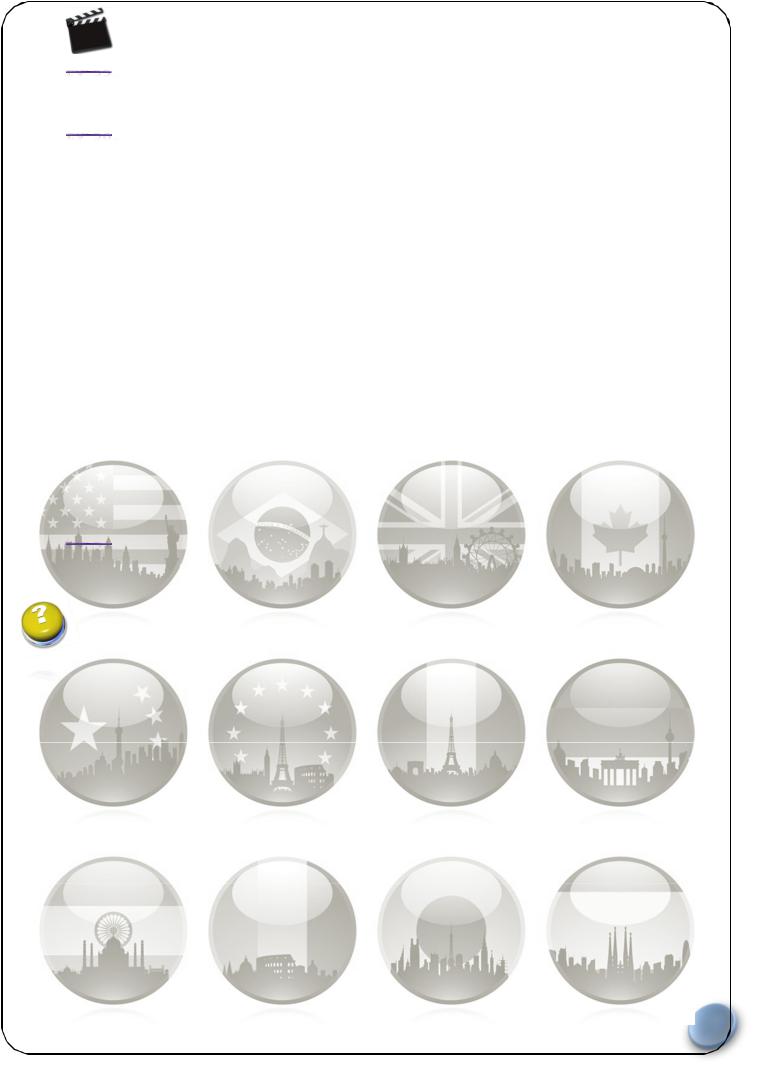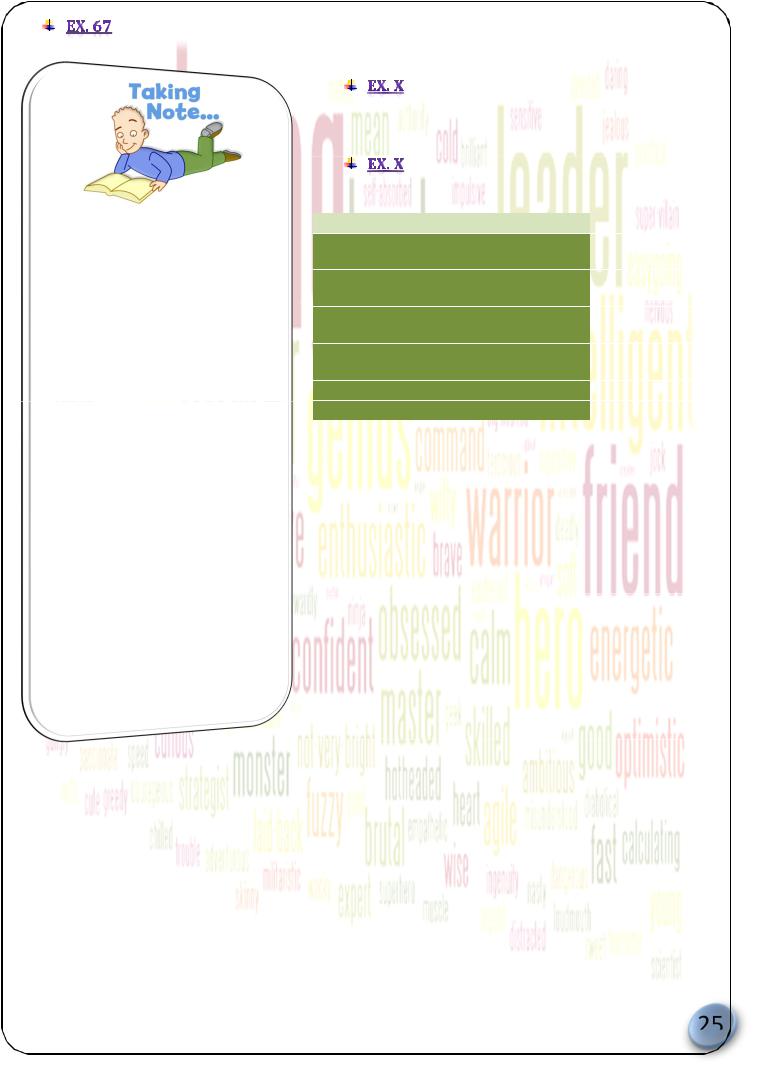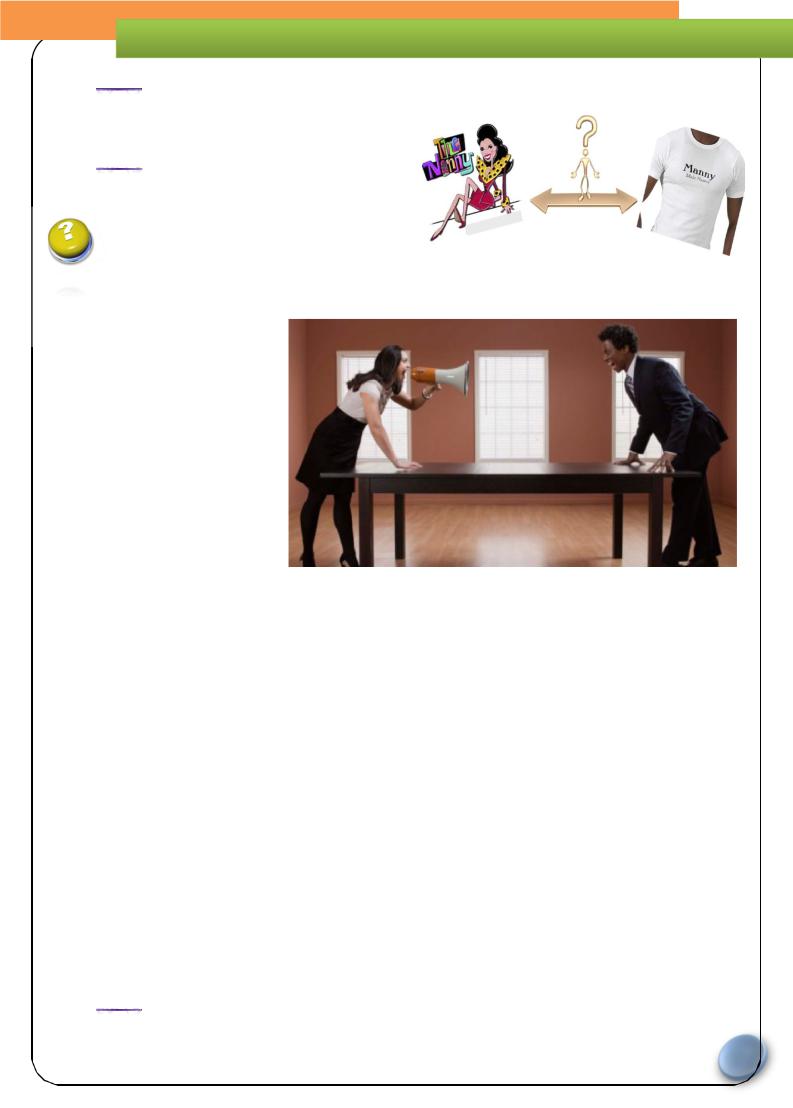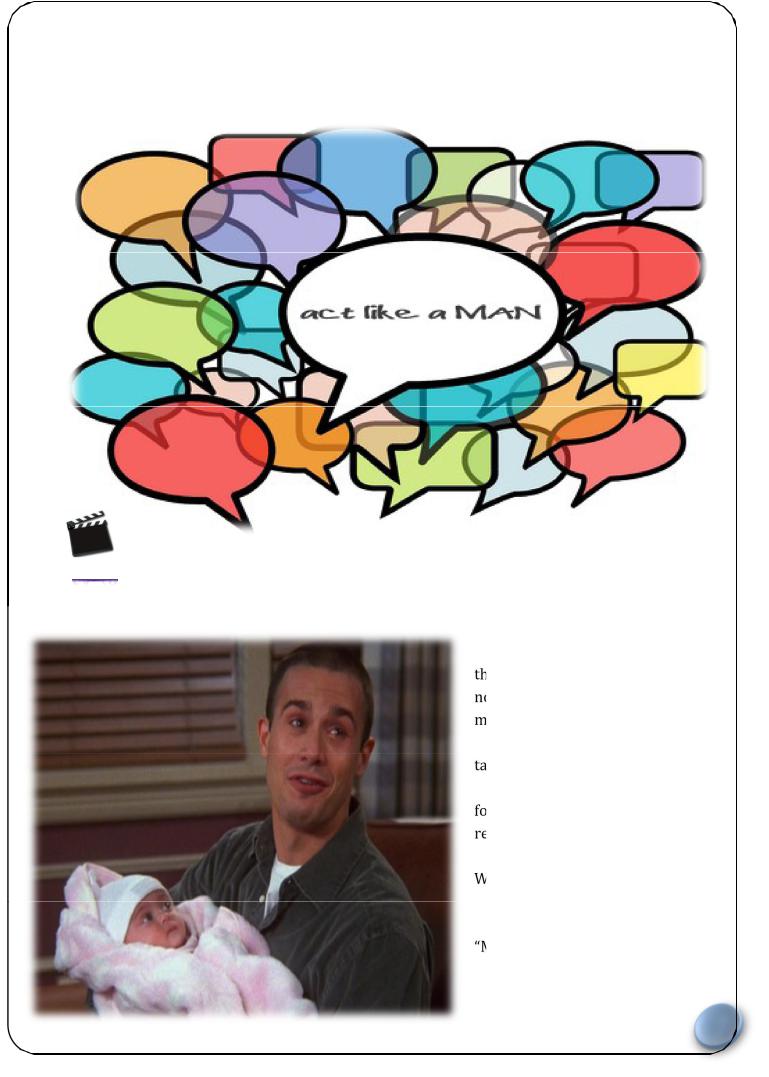
III(2)_Unit_4_Communication_ST
.pdf



 : Someresearchers statethat modern system of education equates intelligence with knowledgeof English.What can bedoneto stop this tendency?
: Someresearchers statethat modern system of education equates intelligence with knowledgeof English.What can bedoneto stop this tendency?




 : Watch the video. Complete the gaps in the sentences and translatethe words.
: Watch the video. Complete the gaps in the sentences and translatethe words.
1)But sadly, today, languages are dying ………………………………….. . A language dies every 14 days.
2)We were brought to teach English because the government wanted to modernize the country and ………………………………….. .
3)Now this is the major change that I've seen - how teaching English has
………………………………….. from being a ………………………………….. to becoming a massive international business that it is today.
4)Now can it be right to ………………………………….. a student ………………………………….. alone?
5)We put a stop sign, and we stop them in their tracks. They can't ………………………………….., 'til they get English.
6)What about the research? It's all in English. So the books are in English, the journals are done in English, but that is a ………………………………….. . It feeds the English requirement.
7)Which tells us that when students come to us from abroad, we may not be
………………………………….. for what they know, and they know it in their own language.
8)“The children can lead Africa from what it is today, a dark continent, to a light continent." A simple idea, but it could have such ………………………………….. .





 : Answer the questions.
: Answer the questions.
1)Do you agree that today tests reject students on their linguistic ability alone?
2)What can be done to stop languages from dyingat unprecedented rate?
3)What English test appeared in 1964? What other tests of English do you know?
4)What are the average fees for the tests today? Do you think high fees can prevent students with lower income from entering universities and pursuing their dreams?
5)Give several examples of when knowledge of several languages can turn out to be beneficial?
Unit 4: Student’s Book
20

Theme Three: Across Cultures

 In small groups,discussthequestions below.
In small groups,discussthequestions below.
1.What do you think defines people from your country?
2.What is important to them? What do they value?
3.How do you think people from other countries see you?

 Read the statements below about British people.
Read the statements below about British people.
Which do you think are trueand which are false?
The British are ...
1serious
2reluctant to express their feelings
3extravagant shoppers
4calm, patient drivers
5home lovers
6open and direct communicators
7interested in social status
8excessively polite
9are very tolerant
10feel superior to other nations
Compare your ideas with apartner.

 Read the read thearticle check your ideas.
Read the read thearticle check your ideas.


 You're going to listen to four people talking about the typical characteristics of people from their country (England, Ireland, Scotland, and the USA). Before you listen, with a partner try to predict what positiveand negative characteristics the speakersmight mention.
You're going to listen to four people talking about the typical characteristics of people from their country (England, Ireland, Scotland, and the USA). Before you listen, with a partner try to predict what positiveand negative characteristics the speakersmight mention.
____________________________________ ____________________________________
____________________________________ ____________________________________
____________________________________ ____________________________________
____________________________________ ____________________________________
____________________________________ ____________________________________
____________________________________ ____________________________________
____________________________________ ____________________________________
____________________________________ ____________________________________

 Listen and try to match the speakers 1-4 with their nationality. Use their
Listen and try to match the speakers 1-4 with their nationality. Use their
accent and what they sayabout people fromtheir country to help you.
English |
|
|
Scottish |
|
Irish |
|
|
American |
|

 Listen again. Write down at least one negative and two positive characteristics
Listen again. Write down at least one negative and two positive characteristics
about each nationality. Does each person think they are typical or not? Why (not)?

 In pairs or small groups, discuss the questions.
In pairs or small groups, discuss the questions.
1.What do you think are the strengths of your nationality?
2.What are the weaknesses?
3.In what way would you say you are typical?
1. |
Answer the following questionsand read the text below. |
Book |
What do you think a national stereotype is? |
||
2. |
How is your own nation stereotyped by others? Or perhaps people from certain regions |
4:UnitStudent’s |
|
see them as insulting and disapprove of them.What do you think? |
|
3. |
have a particular image. Think about appearance, habit, lifestyle, way of thinking, and so on. |
|
Do you think there is an element of truth in these stereotypes, or are they completely |
|
|
4. |
unjustified? |
|
Some people view national and regional stereotypes as harmless and funny, while others |
|

 cold and reserved, Brazilians are lively and fun-loving, and the Japanese are shy and hardworking - these are examples of national stereotypes which are widely believed, not only by other nationalities but also by many people among the nationality themselves. But how much truth is there in such stereotypes? Two psychologists, Robert McCrae and Antonio Terracciano, have investigated the subject and the results of their research are surprising. They found that people from a particular country do share some general characteristics, but that these characteristics are often very different from the stereotype.
cold and reserved, Brazilians are lively and fun-loving, and the Japanese are shy and hardworking - these are examples of national stereotypes which are widely believed, not only by other nationalities but also by many people among the nationality themselves. But how much truth is there in such stereotypes? Two psychologists, Robert McCrae and Antonio Terracciano, have investigated the subject and the results of their research are surprising. They found that people from a particular country do share some general characteristics, but that these characteristics are often very different from the stereotype.
 a team of psychologists used personality tests to establish shared characteristics among 49 different nationalities around the world. They then interviewed thousands of people from these same groups and asked them to describe typical members of their own nationality. In most cases the stereotype (how nationalities saw themselves) was very different from the results of the personality tests (the reality).
a team of psychologists used personality tests to establish shared characteristics among 49 different nationalities around the world. They then interviewed thousands of people from these same groups and asked them to describe typical members of their own nationality. In most cases the stereotype (how nationalities saw themselves) was very different from the results of the personality tests (the reality).
 Italians and Russians thought of themselves as extrovert and sociable, but the
Italians and Russians thought of themselves as extrovert and sociable, but the
personality tests showed them to be much more introvert than they imagined. The Spanish saw themselves as very extrovert, but also as rather lazy. In fact, the research showed them to be only averagely extrovert and much more conscientious than they thought. Brazilians were quite neurotic - the opposite of their own view of themselves. The Czechs and the Argentinians thought of themselves as bad-tempered and unfriendy, but they turned out to be among the friendliest of all nationalities. The English were the nationality whose own stereotype was the furthest from reality. While they saw themselves as reserved and closed, Dr McCrae's research showed them to be among the most extrovert and open-minded of the groups studied.
 the whole study where people saw themselves as they really are was the Poles - not especially extrovert, and slightly neurotic.
the whole study where people saw themselves as they really are was the Poles - not especially extrovert, and slightly neurotic.


 hope that their research will show that national stereotypes are inaccurate and unhelpful and that this might improve international understanding - we're all much more alike than we think we are!
hope that their research will show that national stereotypes are inaccurate and unhelpful and that this might improve international understanding - we're all much more alike than we think we are!


 Decide whether the statements below are True √ or False .
Decide whether the statements below are True √ or False .
1. A lot of people don’t share the stereotypical attitudes towardstheir own nation.
2. Accordingto the psychologists’s research peopleof one nationality have some traits in common.
3. Stereotypes correctly represent a nation’s characteristics.
4. Research proves that people’s view on their own nation complies with the
stereotype.
5. Accordingto the survey the Britons’ view on themselves was close to the
stereotype.
6. The poles turned out to be the most accurate in their assumptions about
themselves.
7. The research showed the bias of stereotypes.
8. The researchers arrived at the conclusion that people of different nationalities are absolutely different.
23
Unit 4: Student’s Book

24
Student’s Book: Notes

Findin the text all the character-describing adjectives, make a list. |
|
|||||
|
|
antonyms. Inyour list, group synonymsand |
||||
|
|
your list. |
To the definitions below find words in |
|||
|
|
definition |
|
|
||
|
|
|
|
adj |
||
____________________ |
|
willing to consider and accept other |
|
|
||
|
|
|
||||
____________________ |
|
people's ideas |
|
|
||
|
|
friendly and enjoying being with other |
|
|
||
|
|
nervous and embarrassed about meeting |
|
|
||
|
|
|
|
|||
____________________ |
|
people |
|
|
|
|
|
|
and speaking to other people |
|
|
||
____________________ |
|
quiet and shy, and not enjoyingthe |
|
|
||
|
|
company of other people |
|
|
||
____________________ |
|
careful to do everything that it is your job |
|
|
|
|
|
|
unwilling to express your emotions |
|
|
|
|
____________________ |
|
Which words from the list best describe your |
||||
|
|
compatriots? |
|
|||
____________________
____________________
____________________
____________________
____________________
____________________
Unit 4: Student’s Book

Hometask 4


 Read the text.
Read the text.
AmericanValuesandAssumptions
People who grow up in a particular culture share certain values and assumptions. That does not mean they all share exactly the same values to exactly the same extent. It does mean that most of them, most of the time, agree with each other's ideas about what is right and wrong, desirable and undesirable, and so on. They also agree, mostly, with each other's assumptions about humannature, socialrelationships, and so on. . .
5 A culture can be viewed as a collection of values and assumptions that go together to shape the way a group of people perceives andrelates totheworld around them.
INDIVIDUALISM
The most important thing to understand about Americans is probably their devotion to individualism. They are trained from very early in their lives to consider themselves as separate individuals who are responsible for their ownsituations
10 inlife…
You canseeit intheway Americans treat theirchildren. Oneday I was ata localshopping mall, waiting inlineto buy an Orange Julius. (An Orange Julius is a cool drink made in a blender with orange juice, ice, and some other ingredients.) Behind me in the line was a woman with two children, a boy who was about three years old and a girl who was about five. Theboy had his hand inthepocket of his bluejeans, and I could hearthat hehad somecoinsinthere.
15 Theboy asked his mother, "CanIgetanOrangeJulius?"
"No," she said to him. "You don't have enough money left for an Orange Julius. Remember you bought that cookie a while ago. You do have enough money for a hot dog. So you could get a hot dog now if you want to.Or, you could save your money, and sometimelaterwhenyouhaveenoughmoney,wecould comeback hereand youcould getanOrangeJulius."
When I tell this story to people from other countries, they usually react with disbelief. The idea that a child so young
20would even have his own money to spend, let alone be expected to decide how to spend it, seems beyond their comprehension.
But when Americans hear the story, they usually understand it perfectly well. This mother is helping her son learn to makehis owndecisions and to beaccountableforhis ownmoney. SomeAmericanparents might not expect a three-year-
old to makea decisionabout how to spend money, but they certainly understand what themother is doing. She isgetting 25 hersonready fora world inwhich hewillberesponsible forhis choices and theirconsequences.
…
Americans are trained to conceive of themselves as separate individuals, and they assume everyone else in the world is too. When they encounter a person from abroad who seems to them excessively concerned with the opinions of parents, with following traditions, or with fulfilling obligations to others, they assume that the person feels trapped or is weak,
30indecisive, or "overly dependent." They assume all people must resent being in situations where they are not "free to makeuptheirownminds."
COMPETITION
Individualistic Americans naturally see themselves as being in competition with others. Competitiveness pervades the society. It is obvious in the attention given to athletic events and star athletes, who are praised for being "real
35 competitors."
It is also obvious in schools and extracurricular activities for children, where games and contests are assumed to be desirable and beneficial. Competitiveness is less obvious when it is in the minds of people who are consistently comparing themselves with others: who is faster, smarter, richer, better looking; whosechildren are the most successful; whose husband is the best provider or the best cook or the best lover; which salesperson sold the most during the past
40quarter; who earned his first million dollars at the earliest age; and so on. People who are competing with others are essentially alone, trying to maintaintheirsuperiority and,implicitly, theirseparateness from others.
PRIVACY
Also closely associated with the value they place on individualism is the importance Americans assign to privacy. Americans assume that people "need some time to themselves" or "some time alone" to think about things or recover
45their spent psychological energy. Americans have great difficulty understanding people who always want to be with anotherperson, who dislikebeing alone. Americans tend to regard such peopleas weak ordependent.. . .
Americans' attitudes about privacy can be difficult for foreigners to understand. Americans' houses, yards, and even
their offices can seem open and inviting, yet, in the Americans' minds, there are boundaries that other people are simply not supposed to cross. When the boundaries are crossed, the Americans' bodies will visibly stiffen and their manner will
50 becomecoolandaloof.
26
Unit 4: Student’s Book



 Find Russian equivalents to the following words/ word combinationsfrom the text.
Find Russian equivalents to the following words/ word combinationsfrom the text.
Word |
|
Russian equivalent |
|
|
|
values andassumptions(l.1) |
|
|
|
|
|
relateto (l.6) |
|
|
devotion to (l.8) |
|
|
|
|
|
beyondsomebody’s comprehension |
|
|
(l.20) |
|
|
accountablefor (l.23) |
|
|
|
|
|
excessively(l.28) |
|
|
competitiveness (l.33) |
|
|
|
|
|
implicitly(l.41) |
|
|
aloof (l.50) |
|
|


 Answer the following questions.
Answer the following questions.
1.Which of the values mentioned in the text do you / your family/ your nation share?
2.Explain what a visitor to your country should know inorder to avoid intercultural misunderstandings.
3.Describe an experience you had in a foreign country or culture that helped you understand it better.

 Read the chapter from thebook American Ways: A Guide for Foreigners in the UnitedStatesby Gary Althen (it’s available on the internet: http://9802-oral- communication.wikispaces.com/file/view/American+Values+and+Assumptions.pdf) and get ready to speak on the things that surprisedyou most or things you strongly dis/agree with.
Read the chapter from thebook American Ways: A Guide for Foreigners in the UnitedStatesby Gary Althen (it’s available on the internet: http://9802-oral- communication.wikispaces.com/file/view/American+Values+and+Assumptions.pdf) and get ready to speak on the things that surprisedyou most or things you strongly dis/agree with.


 Vocabulary Practice (teacher’s instruction)
Vocabulary Practice (teacher’s instruction)
Unit 4: Student’s Book
27

Talking Points: Manny?


 Listen to the song by James Brown"It's aman, man's world”. What is the
Listen to the song by James Brown"It's aman, man's world”. What is the
singer'smessage?Can you remember any other songs that convey a similar idea? Work in groups.


 Discuss the fillowing points.
Discuss the fillowing points.
1.What are professional stereotypes?
2.What career do you aspire to?
3.Read the article below and sum it up in3-4 sentences.
4.How far do you agree with the author's conclusion?
Are men from Mars? What we learned on Friday night
BY Rosie Ifould
Do women really nag? Are men still allergic to ironing? When it comes to relationships, do we still stereotype one another?
All this, and more, was the subject of hot debate on Friday night at the Tavistock Centre for Couple Relationships in central London. It was the first of our new series, all about the hidden psychology of love. First up, does gender still divide us?' chaired by Professor
Brett Kahr with Susannah Abse of the Tavistock, psychoanalyst Dr Avi Schmueli and Sara Ramsden, TV excutive responsible for, amongst others, a documentary series 'Why Men Don't Iron.'
So, does gender still divide us? A quick audience vote showed that we almost unanimously thought it did (the only naysayers were both men). There was less consensus on how much our gender differences should matter — are they just, as Freud put it, the narcissism of minor differences or do they go deeper?' asked Kahr.
There isn't room here to elaborate on every single point, but among the thingswe discussed were: How important the social context was when it comes to gender. Sara Ramsden pointed out that in the 90s when she was making programmes about sex differences, it was terribly un-PC to acknowledge they might exist.
Whether the real issue was the way we get superior to the opposite sex (as Susannah Abse believed). The more we highlight our differences, the greater the divide between us.
Do sex differences really exist, or do they simply come down to individual personality? If 'maleness' and 'femaleness' are measured by our levels of certain hormones and our performances in certain linguistic or spatial awareness tasks, then what do we make of women who perform well in typically male areas (or vice versa)? Leaving sexual attraction to one side, don't we all know men who display typically female traits? Wouldn't we do better to judge on individual merit instead?
And finally, instead of looking for differences, shouldn't we try harder to find common ground?
(http://www.psychologies.co.uk/news/are-men-from-mars-what-we-learned-on-friday-night/ )


 Look at the "Act Like a Man" Box, answer the questions below and write them
Look at the "Act Like a Man" Box, answer the questions below and write them
down in the box:
28
Unit 4: Student’s Book

1.What does it mean to act like a man?
2.What words or expectations come to mind?


 Read the questions below. Then watch the video["Friends: Male Nanny", 13:23
Read the questions below. Then watch the video["Friends: Male Nanny", 13:23
min] . While watching the video make noteson the following points:
Make a list of things the men that appear in the video do, that are usually associated with the
male sex
How’s Ross feeling when he talks to Sandy? Why?
What reason does Ross give firingSandy? Is it the real
reason?
Does Sandy need references? Why?
What’s Ross’s problem? Is Ross a stereotype of the
“Macho Man” ? Why?
Unit 4: Student’s Book
29
